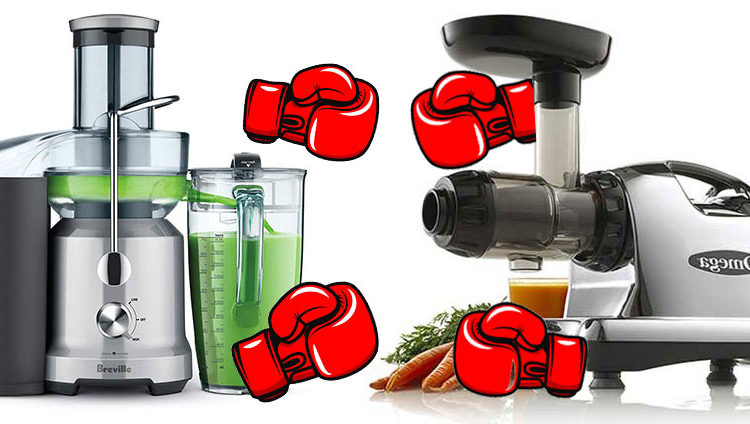Centrifugal juicers typically employ flat cutting blades positioned at the bottom of the unit, somewhat like a standard home blender. The motor runs at high speeds, and the blades shreds the fruits or vegetables with great force. With its high speed, the centrifugal juicer can create a good deal of heat. It is also typically very noisy. These types of juicers suffer from faster wear and tear due to the high friction of the motor and the other moving parts.
On the other hand, a masticating juicer uses either a twin or single auger to “chew” through the vegetables and fruits. The motor runs at a slower speed, producing less friction and less heat. The pulp from the produce is essentially squeezed, with the juice exiting the juicer by way of a spigot. The leftover pulp is pushed free from the juicer to prevent clogging. This masticating process is much more thorough than that of the centrifugal juicers. The yield from the same amount of fruits or vegetables will be much higher with a masticating juicer. The augers chew through the fibers and cell walls of the produce for maximum efficiency.
Because the motor runs at a slower speed, the pulp is not as upset by the juicing process, and less oxygen is thus introduced into the juice. This extends the juice’s shelf life, keeping the juice fresher and more nutrient rich in your refrigerator. What’s more, the slower speed of the augers produces less heat and friction, protecting the juice from being denatured. Heat and force can destroy the enzymes, vitamins, and other natural constituents of fresh juice.
The masticating juicer is much more versatile than the centrifugal. In addition to soft produce, the masticating units will extract juice from wheatgrass and leafy vegetables, types of produce that centrifugal juicers can’t handle. Masticating juicers also puree and homogenize.
These kinds of juicers can produce nut butters, fruit pastes, and baby foods in addition to healthy, delicious juice. They double as food mills as well, chopping spices and seasonings. Masticating juicers are often equipped to grind fish and meat for quick, delicious meals.
Although the initial price of some masticating juicers is higher than that of centrifugal units, you will end up saving money with a masticating juicer very quickly. The masticating juicer requires less fruits and vegetables for the same juice yield, the juice will keep better for longer, and the juice will be better for you. What’s more, your masticating juicer will hold up better, lasting a lifetime, saving you money in the long term.
Masticating juicers are easy to clean. Pulp is separated out from the juice, eliminating the clogging that occurs with centrifugal models. The slower engine speeds of masticating juicers means much less operational noise. No need to fill your home with whirring, shredding engine noise each morning. Masticating juicers are the choice for those who want the best juice every day.
To learn more about masticating wheatgrass juicers and centrifugal juicers, visit Juicing Nation.

